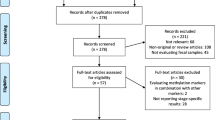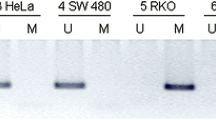Abstract.
DNA hypermethylation is one of major epigenetic changes. Hypermethylation of many genes has been reported to be related with carcinogenesis and tumor progression of colorectal cancer. Some genes including estrogen receptor is associated with ageing, and changes related with ageing may be accelerated in inflammatory bowel disease. Furthermore, fecal DNA methylation will be able to be used as a marker of colorectal cancer and inflammatory bowel disease. Evaluation of hypermethylation potentially contributes diagnosis of colorectal diseases.
Similar content being viewed by others
Author information
Authors and Affiliations
Corresponding author
Additional information
Received 12 July 2006; accepted 21 August 2006
Rights and permissions
About this article
Cite this article
Maeda, O., Ando, T., Watanabe, O. et al. DNA hypermethylation in colorectal neoplasms and inflammatory bowel disease: a mini review. Inflammopharmacol 14, 204–206 (2006). https://doi.org/10.1007/s10787-006-1540-6
Published:
Issue Date:
DOI: https://doi.org/10.1007/s10787-006-1540-6




